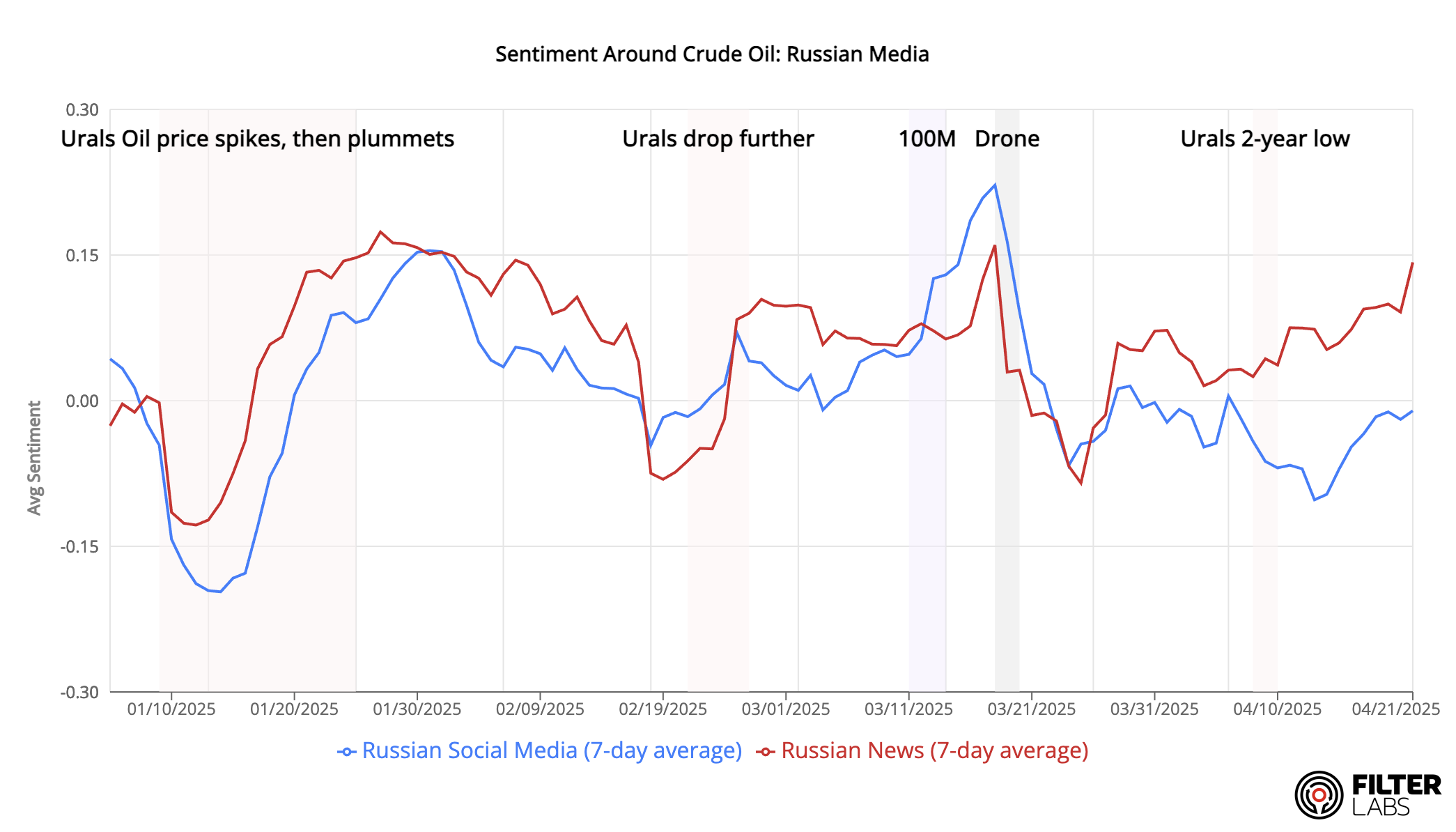Oil Prices are Falling. Do Russians Care?
Russia’s economy suffered another blow this month, with the price of Russian crude oil falling below $60 a barrel after OPEC+ countries announced they would ramp up oil production. The price of Urals Oil (a benchmark for Russian oil exports) had already been trending downward since July of 2024, with occasional short-lived spikes.
Given the importance of oil revenues for Putin’s wartime economy, FilterLabs has been following the story closely, analyzing millions of news stories and social media artifacts to see how people are talking about the plummeting price of oil. Using Talisman, our data dashboard, we’ve identified four main narratives:
- Blame Trump: Many news articles and social media posts blame Trump or his tariffs for the instability and hint that this is a deliberate ploy for greater US influence over Russia and the Middle East. As one Facebook commentator wrote: “This is nothing new! Ronald Reagan did the same thing in the mid-eighties, and a few years later the USSR was gone!”
- Europe has it worse: Commentators pointed out that, due to sanctions, European nations are unable to take advantage of the low prices. One user’s VK post from April 7 concentrates exclusively on the EU, pointing out that European countries overpaid 544 billion euros over three years due to an import ban on Russian oil. The implication: No wonder their economies are struggling!
- Anxiety about China: Russia is China’s largest supplier of oil, but FilterLabs found some grumbling about the fact that China was now benefiting from low prices on top of existing discounts. Russian social media users are especially cynical about China: “China knows Russia will sell oil on the cheap,” wrote one Facebook commenter. Coupled with concerns about Chinese goods flooding the Russian market, the grumbling suggests many Russians view China as an economic competitor, not just an ally.
- Russia will persevere: The news about oil prices is bad, and a sense of real alarm is evident even in Russia’s mainstream news outlets and government statements. But the government officials are managing the situation, and Russia will come out strong in the end—at least according to high-ranking officials. Presidential press secretary Dmitry Peskov assured the public that “Our economic authorities are monitoring this situation very closely, and, of course, they are doing and will do everything necessary to minimize the consequences of this international economic storm for our economy.” Many stories highlighted oil industry achievements and infrastructure projects; for example, a flood of posts on March 13 and 14 celebrated the 100 millionth ton of oil transported by the state-owned oil pipeline company Transneft. And this past weekend enthusiastic coverage of various development projects helped drive sentiment up.
Finally, a narrative that wasn’t. Noticeably absent from the discourse was much if any discussion of the war in Ukraine, or the Kremlin’s dependence on oil revenues to fund its ongoing Special Military Operation.
In other words: Russian social media users and the mainstream press seem content in most cases to blame outsiders for the state of their nation’s economy, rather than their own government.
Explore the Data in Talisman
Have questions of your own? Want more hyper-local insights into hard-to-reach places (like Russia) around the world? Check out the live data on our platform, Talisman! All subscribers can check out the live chart above, along with another we created for our research on this piece; those with full-access subscriptions can also investigate the individual artifacts underlying them, and so much more.
If you don’t have a Talisman account yet, sign up now—a basic subscription is free!
%20-%20Tradmark.png)
